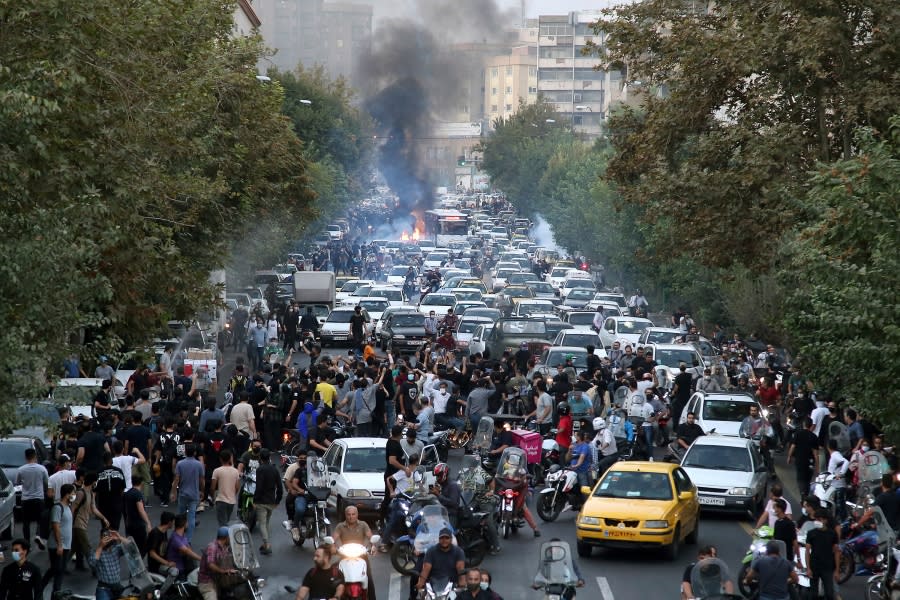Iran deals with intense anger over woman’s death

Iran is facing some of its worst unrest in years as protests erupt over the death of a 22-year-old woman in the custody of the state’s morality police.
Mahsa Amini had been arrested for allegedly wearing a hijab improperly, in violation of Iran’s strict dress code.
Amini died three days after collapsing at a detention center in Tehran, and reports suggest she was “severely beaten” while detained, according to the United Nations Human Rights Office. Iranian authorities claimed Amini died of a heart attack, and the U.N. office called for an investigation.
Outrage has overtaken the country in the week since Amini’s death, and the capital city of Tehran is awash with unrest as Iran’s police and paramilitary Revolutionary Guard reportedly try to control the demonstrations “with live ammunition, pellet guns and teargas,” according to the UN.
Thousands of protesters in cities throughout Iran are said to have taken part in the protests so far.
At least nine people have been killed in the fighting, though a tally on Iran state television reportedly put the count at 17, according to CBS. Other estimates suggest the number may be even higher.
The protests have garnered international attention, and international leaders — including some in the United States — have moved to condemn Iran for both its treatment of women and its reaction to the protesters.
“The Iranian government needs to end its systemic persecution of women and allow peaceful protest. The United States will continue to voice our support for human rights in Iran and hold those who violate them to account,” said U.S. Secretary of State Antony Blinken in a statement.
The U.S. Treasury Department on Thursday sanctioned the morality police “for abuse and violence against Iranian women and the violation of the rights of peaceful Iranian protestors,” asserting in a release that the police were responsible for Amini’s death.
“We condemn this unconscionable act in the strongest terms and call on the Iranian government to end its violence against women and its ongoing violent crackdown on free expression and assembly,” said Treasury Secretary Janet Yellen in a statement.
The department also sanctioned seven Iranian security leaders for overseeing the violence.
President Biden mentioned the ongoing protests in remarks before the United Nations General Assembly Wednesday.
“Today, we stand with the brave citizens and the brave women of Iran who right now are demonstrating to secure their basic rights.”
Biden also underscored the longstanding U.S. effort to keep nuclear weapons out of Iran.
“We will not allow Iran to acquire a nuclear weapon … We cannot let the world now slide backwards, nor can we turn a blind eye to the erosion of human rights,” Biden said.
The administration has been working to revive the nuclear deal from which former President Trump withdrew in 2015.
A group of U.N. experts said Amini “is another victim of Iran’s sustained repression and systematic discrimination against women and the imposition of discriminatory dress codes that deprive women of bodily autonomy and the freedoms of opinion, expression and belief.”
Women in Iran have been burning their hijabs and cutting their hair in protest of the restrictive modesty requirements.
In 2017, the head of the morality police announced that arrests under the dress code would cease, but the practice appears to have been resumed under current Iranian President Ebrahim Raisi, according to The Associated Press.
CNN anchor Christiane Amanpour on Thursday was set to conduct the first U.S.-soil interview of Raisi during the United Nations General Assembly session.
The plan fell through when Amanpour declined Raisi’s insistence that she wear a headscarf during the on-camera interview.
“As protests continue in Iran and people are being killed, it would have been an important moment to speak with President Raisi,” Amanpour said on Twitter.
Iran is no stranger to protest within its borders. Unrest broke out in 2019 over high fuel prices in the country, and protests surged in 2021 over water and electricity shortages.
As Iran tries to control the protests, the internet has been shut down in some places and access to platforms like WhatsApp has been blocked, quelling protesters’ ability to communicate and share information on social media.
Raisi addressed the United Nations General Assembly on Wednesday, saying Iran “rejects some of the double standards of some governments vis-a-vis human rights,” but didn’t directly mention the ongoing protests on his home turf.
For the latest news, weather, sports, and streaming video, head to The Hill.

